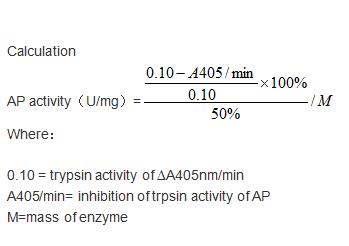Active Aprotinin (AP)
BPTI; Trasylol; Pancreatic Trypsin Inhibitor; Basic protease inhibitor
- Product No.APA968Po61
- Organism SpeciesSus scrofa; Porcine (Pig) Same name, Different species.
- Buffer FormulationPBS, pH7.4, containing 5% Trehalose.
- TraitsFreeze-dried powder
- Purity> 90%
- Isoelectric Point6.3
- ApplicationsCell culture; Activity Assays.
- Download Instruction Manual
- UOM 10µg50µg 200µg 1mg 5mg
-
FOB
US$ 295
For more details, please contact local distributors!US$ 738
For more details, please contact local distributors! US$ 1476
For more details, please contact local distributors! US$ 4428
For more details, please contact local distributors! US$ 11070
For more details, please contact local distributors!
ACTIVITY TEST of the Active Aprotinin (AP)

Aprotinin (AP) is a competitive serine protease inhibitor. Reversibly binds to and blocks the enzymatic active site. Inhibits a range of serine proteases including trypsin, chymotrypsin, kallikrein and plasmin. Inhibits cytopathogenic effect of SARS-CoV-2 and double-stranded RNA formation in SARS-CoV-2-infected cells. The activity of recombinant pig AP was measured by its ability to inhibit trypsin cleavage of a peptide substrate BAPNA in the assay buffer 200 mM Triethanolamine hydrochloride, 20 mM CaCl2, pH 7.8. The reaction was performed in adding 20 μl 4 mg/mL trypsin diluted by 1mM HCl to 160 μl assay buffer and 20 ul 0.85% (w/v) NaCl and start the reaction by adding 100 µl of 1mg/ml BAPNA. Include a substrate blank containing 160 μl assay buffer, 20 μl 1mM HCl, 20 ul 0.85% (w/v) NaCl and 100 µL of 1mg/ml substrate. Rapidly mixing at 25 ℃, then read at 405 nm in kinetic mode for 5 minutes using a microplate reader controlling the ∆A405nm/min=0.08-0.12. The 20 ul different concentrations of recombinant pig AP was incubated with 20 ul 4 mg/mL trypsin in 160 ul assay buffer at 25℃ for 10 minutes followed by adding 100 ul substrate, then read at 405 nm in kinetic mode for 5 minutes using a microplate reader. Under these conditions, the enzyme amount of 50% inhibition of trypsin activity per minute is defined as a unit. The specific activity of recombinant pig AP is >9000 U/mg.
USAGE of the Active Aprotinin (AP)
Reconstitute in 10mM PBS (pH7.4) to a concentration of 0.1-1.0 mg/mL. Do not vortex.
STORAGE of the Active Aprotinin (AP)
Avoid repeated freeze/thaw cycles. Store at 2-8°C for one month. Aliquot and store at -80°C for 12 months.
STABILITY of the Active Aprotinin (AP)
The thermal stability is described by the loss rate. The loss rate was determined by accelerated thermal degradation test, that is, incubate the protein at 37°C for 48h, and no obvious degradation and precipitation were observed. The loss rate is less than 5% within the expiration date under appropriate storage condition.
INCREMENT SERVICES
BCA Protein Quantification Kit
Molecular Mass Marker for Protein
Monoclonal Antibody Customized Service
Polyclonal Antibody Customized Service
Protein Activity Test Experiment Service
Electrophoretic Mobility Shift Assay (EMSA) Experiment Service
Buffer
Lentivirus Packaging Experiment Service
Adenovirus Packaging Experiment Service
Real Time PCR Experimental Service
Spike RBD Protein (S-RBD)
Protein G
Protein A
Related products
| Catalog No. | Organism species: Sus scrofa; Porcine (Pig) | Applications (RESEARCH USE ONLY!) |
| RPA968Po02 | Recombinant Aprotinin (AP) | Positive Control; Immunogen; SDS-PAGE; WB. |
| RPA968Po03 | Recombinant Aprotinin (AP) | Positive Control; Immunogen; SDS-PAGE; WB. |
| EPA968Po61 | Eukaryotic Aprotinin (AP) | Positive Control; Immunogen; SDS-PAGE; WB. |
| APA968Po61 | Active Aprotinin (AP) | Cell culture; Activity Assays. |
| EPA968Po62 | Eukaryotic Aprotinin (AP) | Positive Control; Immunogen; SDS-PAGE; WB. |
| RPA968Po01 | Recombinant Aprotinin (AP) | Positive Control; Immunogen; SDS-PAGE; WB. |
| PAA968Po01 | Polyclonal Antibody to Aprotinin (AP) | WB; IHC; ICC; IP. |
| MAA968Po21 | Monoclonal Antibody to Aprotinin (AP) | WB; IHC; ICC; IP. |
| CEA968Po | ELISA Kit for Aprotinin (AP) | Enzyme-linked immunosorbent assay for Antigen Detection. |
| LMA968Po | Multiplex Assay Kit for Aprotinin (AP) ,etc. by FLIA (Flow Luminescence Immunoassay) | FLIA Kit for Antigen Detection. |

